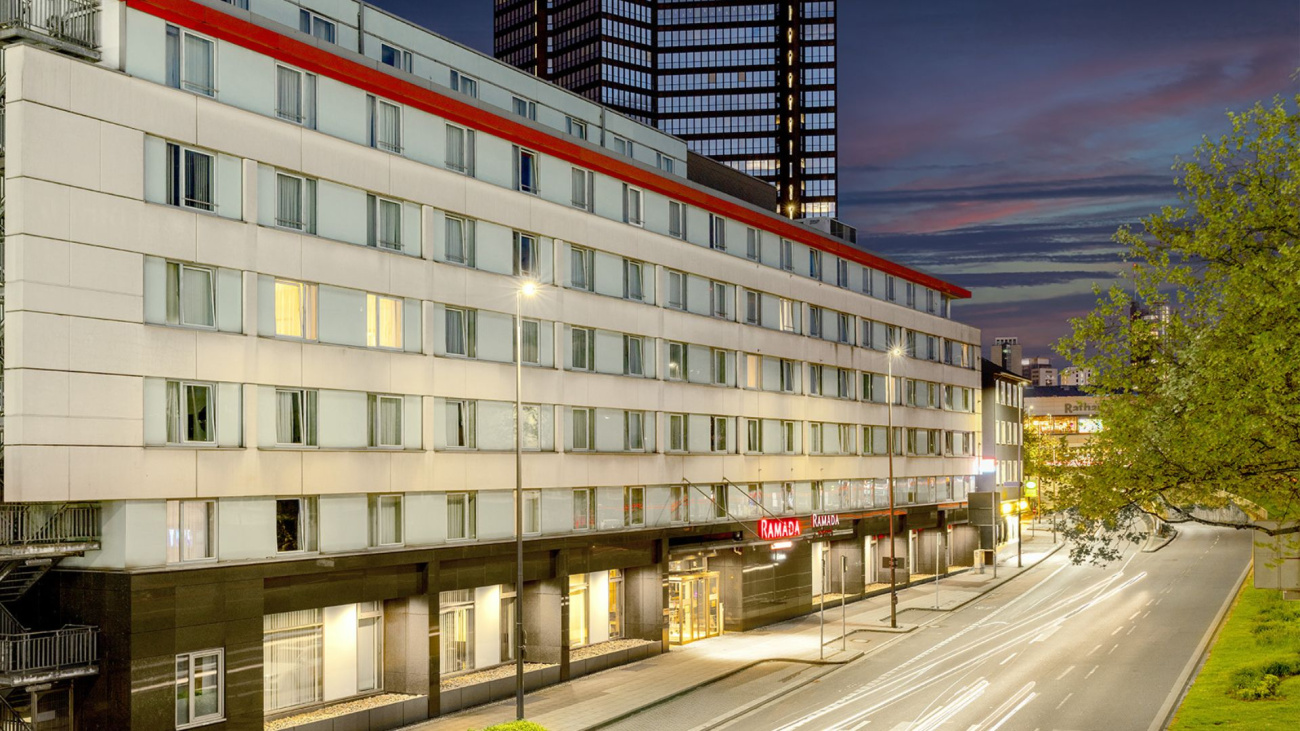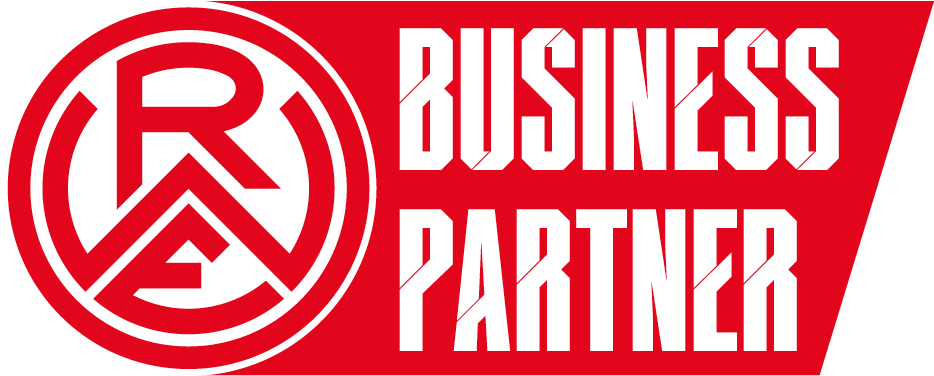HERZLICH WILLKOMMEN BEI UNS IM RAMADA BY WYNDHAM ESSEN
A WARM WELCOME TO RAMADA BY WYNDHAM ESSEN
Sehr geehrte Gäste,
Herzlich willkommen im Ramada by Wyndham Essen. Das gesamte Team freut sich, dass Sie unser Hotel für Ihren Aufenthalt in Essen gewählt haben.
Unser Personal steht Ihnen jederzeit zur Verfügung und wir werden alles dafür tun, dass Sie einen angenehmen Aufenthalt bei uns haben.
Die nachfolgenden Gästeinformation bietet Ihnen einen Überblick über unseren angebotenen Service im Hotel. Sie können sich jederzeit an uns wenden, sollten Sie weitere Fragen oder einen speziellen Wunsch haben.
Im Namen des gesamten Teams wünsche ich Ihnen einen schönen Aufenthalt bei uns und eine tolle Zeit in Essen und Umgebung.
Mit freundlichen Grüßen,
Maria Köster
General Manager
Dear Guests,
Welcome to Ramada by Wyndham Essen. The entire team is pleased that you have chosen our hotel for your stay in Essen.
Whether you are here for business or leisure, our friendly colleagues are always at your disposal and we will do everything to ensure that you have a wonderful stay with us.
The following guest information provides you with an overview of our offered services in the hotel. You can always contact us if you have any further questions or a special request which we can assist you with.
On behalf of the entire team, I wish you a very pleasant stay with us and an unforgettable time in Essen and the surrounding area.
Sincerely,
Maria Köster
General Manager
Gästeinformation / Guest Directory
Telefonnummern / Telephone numbers
Rezeption / Reception
Nummer 181 / Please dial 181
Zimmer zu Zimmer / Room to room :
Gewünschte Zimmernummer wählen / Please dial desired Room number only
Externe lokale Telefonate / External local calls
Bitte wählen Sie zuerst die „0“ und dann die gewünschte Rufnummer / Please dial „0“ at first and then the desired local number
Internationale Ferngespräche / International calls
Für internationale Ferngespräche wenden Sie sich bitte an die Rezeption / Please contact reception for international calls
Notfallnummern / Emergency numbers
Bitte wählen Sie „0“ und 110 (Polizei) und 112 (Feuerwehr) / Please dial „0“ and 110 (Police) or 112 (Fire brigade)
Internet / Internet
Im gesamten Hotel haben Sie WLAN-Empfang mit folgenden Zugangsdaten:
Throughout the hotel you can connect to our wifi with below log in:
Wi-Fi Network: RamdaEssen
Password: RamadaEssen
Fernsehsenderauswahl / TV channels selection
Bitte wenden Sie sich an die Rezeption, sofern Sie Hilfe bei der Bedienung benötigen.
Please contact reception in case you require assistance with the device.
Eine Auswahl an Fernsehsender sehen Sie hier. Weitere Sender und Radiostationen stehen zur Verfügung.
Please see below a selection of TV channels on offer. Additional stations and radio stations are available.
Programmliste / Program list
Services & Informationen / Services & Information
Abreise / Departure
Ihr Zimmer steht Ihnen am Abreisetag bis 12.00 Uhr zur Verfügung. Sollten Sie Ihr Zimmer länger benötigen, setzen Sie sich bitte mit der Rezeption in Verbindung
Your room will be available until 12 p.m. on the day of departure. If you need a late check out, please contact the reception.
Adapter / Adapter
Einen Reisestecker/Adapter sowie Telefonadapter erhalten Sie an der Rezeption
Travel plugs/adapter and telephone adapter are available at the reception
Apotheke / Drug store
Bitte wenden Sie sich an die Rezeption
Please contact the reception
Arzt / Doctor
Bitte wenden Sie sich an die Rezeption
Please contact the reception
Autovermietung / Car rental
Bitte wenden Sie sich an die Rezeption für verschiedene Anbieter.
Please contact the reception for different rental companies
Babybett / Baby beds
Babybetten sind verfügbar für unsere kleinen Gäste. Bitte wenden Sie sich an die Rezeption.
Baby beds are available for our little guests. Please contact the reception
Bademäntel & Slipper / Bathrobs & slippers
Einen Bademantel und Badeslipper bringen wir Ihnen gerne auf Ihr Zimmer. Bitte kontaktieren Sie unsere Rezeption
Bathrobs and slippers are available upon request at the reception.
Bankautomat / ATM
Ein Bankautomat ist in der Nähe verfügbar. Bitte wenden Sie sich an die Rezeption
An ATM is available close by, please contact the reception.
Bar / Bar
Unsere Bar „Red Corner” ist täglich von 17:00 Uhr bis 01:00 Uhr für Sie geöffnet
Our bar is open daily from 17:00hrs to 01:00hrs
Brandschutzanweisung / Fire safety guidelines
Eine Evakuierungsplan hängt in Ihrem Zimmer, bitte wenden Sie sich an die Rezeption für weitere Informationen
An evacuation plan is available in your room. Please contact the reception for more information if required
Bedienungsanleitung Klimaanlage / Room AC manual
Ein/Aus schalten → Knopf gedrückt halten.
Lüftungsstärke ändern → Knopf kurz drücken.
Temperatur anpassen → Wärmer (+), Kälter (-).
Turn ON/OFF → Keep button pressed.
Adjust ventilation intensity → Press button briefly.
Adjust temperature → Warmer (+), Cooler (-).
Bettwäschewechsel / Linen change
Helfen Sie uns die Umwelt zu schonen und folgen Sie den Anweisungen der Karte hinter Ihrer Badezimmertür. Sollten Sie für Sie täglich Ihre Bettwäsche wechseln lassen wollen, kontaktieren Sie bitte die Rezeption
Help us to protect the environment and follow the instructions on the card behind your bathroom door. If you would like to have your bed linen changed daily, please contact the reception
Bezahlung / Payment
Bitte bezahlen Sie Ihre Hotelrechnung an der Rezeption. Neben Bargeld akzeptieren wir auch alle gängigen Kreditkarten
Please pay your hotel bill at the reception. In addition to cash, we also accept all major credit cards.
Briefmarken / Stamps
Briefmarken erhalten Sie an der Rezeption
Stamps are available at the reception.
Business Center / Business center
Unser Business Center ist 24 Stunden geöffnet und befindet sich in der Lobby
Our business center is open 24 hours and is located in the lobby
Bügeleisen/Bügelbrett / Iron & Ironing Bord
Auf Anfrage nach Verfügbarkeit bringen wir Ihnen gerne ein Bügel-Set in Ihr Zimmer. Bitte wenden Sie sich an die Rezeption.
Upon request and availability, we will be happy to bring an ironing set to your room. Please contact the reception
Bügel & Wäscheservice / Dry cleaning
Bitte wenden Sie sich an die Rezeption für einen externen Wäscheservice. Für die chemische Reinigung werktags: Abgabe an der Rezeption bitte vor 9.00 Uhr, Rückgabe am selben Nachmittag.
Please contact the reception for an external laundry service. For dry cleaning on weekdays: please drop off at reception before 9.00 am, return in the afternoon.
Decken / Blankets
Gerne können Sie eine zusätzliche Decke erhalten. Fragen Sie bitte an der Rezeption
You are welcome to receive an additional blanket. Please contact the reception
Diätküche / Dietary requirements
Gerne bereiten wir Ihnen auf Wunsch ein Diät Essen zu. Wir bieten beim Früstück auch vegane und vegetarische Produkte an. Sollten Sie weitere Allergien haben wenden Sie sich bitte an unser Team im Restaurant
We are also happy to prepare a special meal according to your preferences. We also offer vegan and vegetarian products for breakfast. If you have any further allergies, please contact our team in the restaurant.
Drucken / Print
Senden Sie uns das Dokument an info@ramadaessen.com und wir drucken für Sie aus; oder benutzen Sie auch gerne unseren Businesscorner in der Lobby
Send us the document to info@ramadaessen.com, and we´ll print it out for you, or feel free to use our business corner in the lobby
Elektrizität / Electricity
Wechselstrom 220 Volt
Electricity 220 volts
Erste Hilfe / First aid
Ein Erste-Hilfe Kasten befindet sich an der Rezeption
Please contact the reception for first aid kit
Fahrradabstellung / Bicycle parking
Sie können gerne Ihr Fahrrad bei uns in der Tiefgarage parken
You are welcome to park your bike with us in the parking area.
Feueralarm / Fire alarm
Bitte bewahren Sie Ruhe. Bitte beachten Sie den Fluchtwegweiser sowie die Notausgangsleuchten. Folgen Sie den Anweisungen des Personals
Please keep calm and follow the escape routes and the emergency exit lights in the hallways. Follow the instructions of our staff
Feuerlöscher / Fire extinguishers
Befinden sich auf jeder Etage in den Fluren und im Treppenhaus
Available on every floor in the hallways as well as in the staircases
Fitnessraum / Gym
Um Ihren Aufenthalt noch angenehmer zu gestalten, möchten wir Sie über unsere kostenfreie Kooperation mit dem Fitnessstudio FITX informieren. Für nähere Informationen fragen Sie bitte unser Rezeptionsteam.
To make your stay even more pleasant, we would like to inform you about our cooperation with the fitness studio FITX. For more information, please ask our reception staff.
Fotokopien / Photocopies
Fotokopien erstellt Ihnen gerne die Rezeption gegen eine Gebühr von 0,10 € pro Seite
Photocopies can be made at reception for a fee of € 0.10 per page.
Frühstück / Breakfast
Wir freuen uns, Sie an unserem Frühstücksbuffet von 06:30 Uhr bis 10:30 Uhr Mo-Sa begrüßen zu dürfen. An Sonn- und an Feiertagen von 07:00 Uhr bis 11:00 Uhr. Der Preis beträgt 18 Euro pro Person.
We look forward to welcoming you to our breakfast buffet from 06:30 to 10:30am Mo-Sa. On weekends and public holidays from 07:00 to 11:00am. The price is 18 euros per person.
Fundsachen / Lost & Found
Sie haben etwas verloren? Bitte setzen Sie sich mit der Rezeption in Verbindung. Wir bieten auch an, Ihnen Ihre Wertsachen oder ähnliches gegen fällige Portogebühren nachzusenden
Have you lost something? Please contact the reception. We also offer to send you your valuables by post (costs apply)
Geldwechsel / Money Exchange
Leider bieten wir keinen Geldwechsel im Hotel an, allerdings gibt es verschiedene Geldwechselbüros in der Innenstadt von Essen.
Unfortunately, we do not exchange money in the hotel. But multiple exchange offices are available in the city center of Essen.
Gepäck / Luggage
Ihr Gepäck können Sie zur sicheren Aufbewahrung an der Rezeption abstellen. Sollten Sie Hilfe beim Transport Ihres Gepäcks benötigen können Sie sich gerne an die Rezeption wenden.
You can leave your luggage at the reception for safe storage. If you need assistance with carrying your luggage, please contact the reception
Getränke / Drinks
Getränke erhalten Sie kostenpflichtig an der Bar, im Restaurant sowie unserem Zimmerservice während der Öffnungszeiten. Außerdem täglich 24 Stunden an unseren Getränke & Snackautomaten in der Lobby und auf der dritten Etage
Drinks are available for a fee in the bar, restaurant, and our room service during opening hours. In addition, 24 hours a day in our vending machines in the lobby and on the third floor.
Haftung / Liability
Bitte lassen Sie keine Wertsachen im Zimmer und schließen Sie alle Wertsachen in Ihrem Safe ein. Bei Verlust übernimmt das Hotel keine Haftung.
Please do not leave valuables in the room and lock all valuables in your safe. In the event of loss, the hotel assumes no liability
Handtücher / Towels
Helfen Sie uns die Umwelt zu schonen und folgen Sie den Anweisungen der Karte in Ihrem Badezimmer. Auf Wunsch tauschen wir Ihre Handtücher täglich aus. Zusätzliche Handtücher erhalten Sie an der Rezeption.
Help us to protect the environment and follow the instructions on the card in your bathroom. On request, we exchange your towels daily. Extra towels are available at the reception.
Haustiere / Animals
Unsere tierischen Freunde sind bei uns willkommen gegen eine Gebühr von 10,00 € pro Nacht. Wir weisen darauf hin, dass Haustiere im Restaurant nicht zulässig sind und bitten Haustiere im Hotel an der Leine zu führen
All forms of animals are welcome for a fee of 10,00 € per night. We would like to point out that pets are not allowed in the restaurant and kindly ask you to keep pets on a leash in the hotel
Hygieneartikel / Hygiene articles
Haben Sie etwas zuhause vergessen? Gerne stellen wir Ihnen z.B. Zahnbürste, Zahncreme oder Rasier-Set zur Verfügung. Bitte wenden Sie sich an die Rezeption
Have you forgotten something at home? We are happy to provide you with a toothbrush, toothpaste razor. Please contact the reception
Kopfkissen / Pillows
Wie bieten Ihnen gerne auch weichere Kissen, sowie zusätzliche, unterschiedliche Typen von Kopfkissen an – Daunen & Allergiker, Nacken & Lendenkissen, sowie Seitenschläfer Kopfkissen. Bitte wenden Sie sich an die Rezeption.
We do also offer softer pillows, and in addition different types of pillows - down & allergy, neck & lumbar, and side sleeper pillows. Please ask at the reception desk.
Konferenzräume / Meetings & Events
Unser Hotel ist speziell für Ihre Tagung eingerichtet und verfügt über 10 mit Tageslicht durchfluteten klimatisierten Konferenzräumen mit privater Terrasse. Detaillierte Informationen erhalten Sie an der Rezeption. Für die erste Ansicht klicken Sie auf unseren Link direkt zur Veranstaltungsseite:
https://www.wyndhamhotels.com/en-uk/groups?icid=IN:dq8l7irnycdc0rt
Our hotel is specially equipped for your meeting and has 10 daylight-flooded air-conditioned conference rooms with private terrace. Detailed information is available at the reception. For the first view, click on our link directly to the event page:
https://www.wyndhamhotels.com/en-uk/groups?icid=IN:dq8l7irnycdc0rt
Getränke & Snackautomaten / Drink & Snack Vending Maschine
Es stehen Ihnen eine Auswahl an Getränken und Snacks 24 Stunden am Tag in unseren Getränke & Snackautomaten in der Lobby und dritten Etage zur Verfügung.
A selection of drinks and snacks are available 24 hours a day in our drinks & snack vending machines in the lobby and third floor.
Nähzeug / Sewing kit
Ein Nähset finden Sie in Ihrem Kleiderschrank, andernfalls kontaktieren Sie bitte die Rezeption
You will find a sewing kit in your wardrobe, otherwise please contact reception.
Notausgänge / Emergency exits
Bitte folgen Sie den den Hinweisschildern in den Fluren
Please follow the emergency exit signs
Parken / Parking
Unsere Tiefgarage befindet sich unter dem Hotel und kostet 15,00 € pro Tag. Wir bieten auch eine Elektroladestation an. Für das Aufladen berechnen wir einen Festpreis von EUR 20.00 pro PKW. Einfahrtstor-Höhe: 1,90 m
Our Parking garage is located under the hotel and costs € 15.00 per day. We also offer an electric charging station. For charging we charge a fixed price of EUR 20.00 per car. Parking entrance gate height: 1.90m
Post / Postal service
Ihre ausgehende Post wird von unseren Rezeptionsmitarbeitern gern weitergeleitet. Für eingehende Post wird sich die Rezeption mit Ihnen in Verbindung setzen.
Your outgoing mail will be forwarded by our reception staff. For incoming mail, the reception will contact you.
Reinigung / Cleaning
Die Reinigung Ihres Zimmers erfolgt täglich. Sollten Sie keine Reinigung wünschen, wenden Sie sich bitte an die Rezeption oder hängen Ihren „Bitte-Nicht-Stören- Türanhänger“ von außen an Ihre Zimmertür
Your room will be cleaned daily. If you do not wish your room to be cleaned, please contact the reception or place your "Do Not Disturb" sign
Regenschirm / Umbrella
Es regnet? Lassen Sie den Kopf nicht hängen. Wir sind bestens ausgestattet, fragen Sie einfach an unserer Rezeption nach einem Leihschirm. (20 EUR Leihgebühr)
It's raining? Don't let it ruin your day. We are well equipped, just ask at our reception for an umbrella (20,00 EUR rental fee)
Restaurant / Restaurant
Unser Restaurant ist von Montag bis Sonntag geöffnet von 12:00 Uhr bis 22:00 Uhr mit einer Auswahl an internationalen und lokalen Gerichten. Das Team freut sich auf Ihren Besuch
Our restaurant is open Monday to Sunday from 12:00 to 22:00 with a selection of international and local dishes. The team is looking forward to welcome you
Rezeption / Reception
Unsere Rezeption hat für Sie 24h für Sie geöffnet. Sie erreichen die Rezeption unter der Durchwahl 181. Falls Sie Wünsche und Fragen haben, stehen Ihnen unsere Kollegen gern zur Seite
Our reception is open 24 hours. You can reach the reception under extension 181. If you have any request or questions, our colleagues will be happy to assist you.
Safe / Safe
Bitte nutzen Sie den Zimmersafe in Ihrem Kleiderschrank und schließen Sie immer alle Wertsachen ein. Eine Bedienungsanleitung des Safes ist im Inneren verfügbar.
Please use the in-room safe in your wardrobe and always lock all your valuables. An instruction manual of the safe is available inside.
Schuhputzmachine & Schuhputzutensilien / Shoe polishing equipment
Auf jeder Etage befindet sich ein Schuhputzautomat den Sie gerne jederzeit verwenden können. Sollten Sie Schuhputzutensilien benötigen, wenden Sie sich einfach an unsere Rezeption
On each floor is a shoe polishing machine which you can use anytime. If you need shoe polishing utensils, please contact our reception
Schuhanzieher / Shoe horn
Ein Schuhanzieher ist in Ihrem Schrank im Zimmer verfügbar
A shoe horn is available in your closet inside your room
Taxi / Taxi
Sie können jederzeit an der Rezeption ein Taxi bestellen. Wir empfehlen Ihnen dieses einen Tag im Voraus zu buchen, speziell während Messezeiten.
You can always order a taxi at the reception. We recommend that you book your taxi one day in advance, especially during trade fairs.
Telefon / Telephone
Sie können kostenlos in das deutsche Festnetz telefonieren. Wählen Sie bitte die „0“, um eine Amtsleitung zu erhalten. Die Rezeption erreichen Sie unter der Nummer “181”
You can make free calls to the German landline. Please select first "0" to get an official line. The reception can be reached under the number "181."
Weckservice / Wake up call
Sie müssen am nächsten Tag früh raus? Kein Thema, wir übernehmen für Sie gerne Ihren Wecker. Informieren Sie dazu bitte nur unsere Rezeption und wir wecken Sie zur vereinbarten Zeit per Telefon.
You have to get out early the next day? No problem, we are happy to take over your alarm clock for you. Please contact the reception to place your personalized wake-up call




 All offers
All offers

